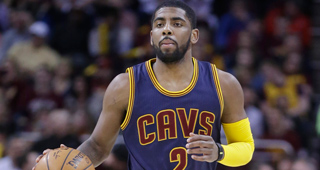- Option One
To describe the pre-LeBron James Cleveland Cavaliers as slogging through forty-plus years of futility is glib but not entirely inaccurate. This is a franchise that was so self-destructively inept under Ted Stepien in the early 80s that when the NBA took decision-making power away from executives—thou shalt not trade away first-round picks in consecutive years, ya dummies—the rule was nicknamed after Cleveland’s beleaguered owner. Until relatively recently, the Cavs’ organizational peak was either an injury-stricken 1976 team losing to the Celtics in the Conference Finals or a Mark Price-led squad getting upset by Jordan’s ‘89 Bulls in the first round. (Yes, The Shot series.) Their being worth a damn is the historical exception, not the rule, and unlike their newfound rivals the suddenly-not-habitually-awful Golden State Warriors, it makes sense that they don’t loom large in the league’s history. Cleveland is a declined, acceptably anonymous midwestern city. It’s not a draw to out-of-towners; it’s hard to love if you’re not from there.
The broader point being: when are the Cavs ever going to be this good again? They’re darkened by the Warriors’ shadow same as everyone else, but it bears remarking that this team would be title favorites in a different era. You can do a lot worse than the most complete player ever, Kyrie Irving’s vast array of offensive skills, Kevin Love’s rebounding and stretchiness, and a rotation stocked with shooters. If they have, say, a five or ten percent chance of winning another championship next season, that’s quite a bit closer than they figure to get anytime in the foreseeable future once LeBron falls off or skips town. If he does flee to Los Angeles next summer and Kyrie is still making trade demands with only a year left on his contract, that’s a serious problem, but it’s probably a risk worth taking.
If the Cavs’ world is ending soon, playing a whit more great basketball is a fine way to spend the time before the proverbial meteor obliterates everything.
- Option Two
Eric Bledsoe and Josh Jackson? Would the Suns do that? Goran Dragic and Justise Winslow? Kyrie and Iman Shumpert for Carmelo Anthony and Frank Ntilikina? Reporting on which teams would do a deal and at what cost is scant, so we’re all just spitballing. What’s clear is that the Cavs, if they part ways with Irving, would need to accomplish something so specific it might be impossible: assembling a roster that could put at least half a scare into the Warriors and keep LeBron interested in the project while also—considering LeBron might bolt—nabbing an asset or two that would be useful in a rebuilding effort.
If they get anything resembling the—scare quotes the size of Peter Gallagher’s eyebrows here—”hauls” that Paul George or Jimmy Butler returned, Dan Gilbert might as well start figuring out who his 2019 lottery rep is going to be, but the Cavs have the benefit, unlike the Pacers and Bulls, of not yet seeming desperate. However sour feelings are behind the scenes and however dead-set Kyrie is on leaving, there’s enough time between now and the moment when the franchise would absolutely need to ship Irving out that Cleveland can keep any potential trade partners honest.
Of course, there’s a meaningful difference between the market for a player being good and being able to find a particular deal that solves all your problems.
- Option Three
A public relations war has muddied the waters. Kyrie wants a team of his own. He wants greater institutional stability. He’s sick of playing little brother to LeBron. You take your pick of what’s spin and what’s fact, but that competing interpretations of Kyrie’s situation are circulating at all is proof that his relationship with LeBron has frayed significantly. The two have never gotten along swimmingly, but Kyrie is the best wingman LeBron has ever had, and though Kyrie might not think so, he’s a championship caliber second banana and a (very entertaining) five-seed’s number one option. The two need each other and don’t know it. Perhaps they can be made to see sense, though in order for that to happen, the Cavs have to first sort out their front office dysfunction—do Kyrie and LeBron know what a Koby Altman is?—long enough to figure out who calls the guys and tries to get them in a room together.
If the relationship with LeBron isn’t salvageable, maybe the relationship with the organization is. Let’s say Kyrie does want a show to run. He might have that opportunity in Cleveland a year from now. The Cavs could give him whatever length of extension he wants, construct an offense around him, and go from there. A Kyrie-led squad wouldn’t be dominant, but flanked by Love, Tristan Thompson, and J.R. Smith, they could make some noise in the weak Eastern Conference. Kyrie might be content to score thirty a night, win forty-five games, and no longer suffer big bro’s baleful gaze. It’s not a happy ending to the saga, but it’s a Cleveland-esque conclusion, which is to say just-okay and a little bit depressing.
The smart money goes on the Cavs screwing this up one way or another. They’re a poorly run shop draped in glory only by dint of LeBron James being born and raised down the road in Akron. Their proclivity for self-sabotage aside, they have a few not-so-straightforward solutions available. There’s a way out of this mess, even if it’s only theoretical.



